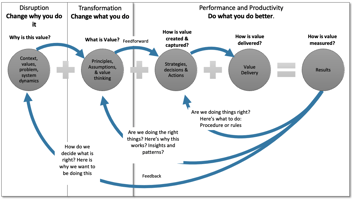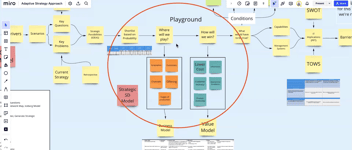As a strategic designer, I've had the opportunity to help clients across the private and government sectors transform their organizations by leveraging the power of strategic experimentation. My mission is to enable clients across private and government sectors to become adaptive, learning organizations by leveraging the power of strategic experimentation. In today's blog, I'll be diving into two key services - Strategic Business Development and Public Policy Experimentation - and discussing their value, implementation, and impact on clients' success, as well as how these services facilitate feedforward design and feedback mechanisms, drawing from triple-loop learning theory to demonstrate how our services promote rapid organizational learning and adaptation.
Strategic Business Development and Public Policy Experimentation are integral services that employ simulation models to help organizations test various scenarios and understand the implications of their decisions on staff, capital, customers, competitors, and public policy. By incorporating feedforward design and feedback mechanisms, we enable clients to learn fast and adjust their strategies and tactics accordingly.
Strategic Business Development involves turning strategic objectives into winning operational objectives. This is often a challenging task, as management decisions may fall short or lead to unintended consequences. By creating coherent simulation models, we enable clients to quickly explore various scenarios and understand the implications of their decisions on staff, capital, customers, and competitors. This powerful insight allows organizations to effectively mitigate risks, seize opportunities for growth, and make more informed decisions.
Public Policy Experimentation is a vital service for government departments and agencies dealing with complex issues such as healthcare delivery, public policies, defense strategies, urban planning, natural resource management, and energy consumption. These challenges often require interdepartmental collaboration at both federal and local levels. We utilize a cutting-edge simulation platform that allows clients to create holistic system diagrams and simulate them over time. This systemic view provides a deep understanding of the system's behaviors and helps identify beneficial changes while avoiding decisions with negative impacts.
Our approach aligns with the concept of triple-loop learning, which extends beyond single-loop (corrective actions) and double-loop (questioning underlying assumptions) learning to include a third loop focused on continuous adaptation and learning. Triple-loop learning empowers organizations to develop strategic flexibility, operational agility, and efficient delivery, making them more adaptive and responsive to the ever-evolving business landscape.
Through strategic experimentation, organizations can identify patterns, develop insights, and ultimately improve their decision-making processes. By embedding feedforward design and feedback mechanisms, we help clients to anticipate and adapt to emerging trends and challenges, ensuring their long-term success.
Both Strategic Business Development and Public Policy Experimentation plug into an organization's decision-making processes, providing valuable insights and fostering more informed choices. Clients should consider incorporating these services during the initial stages of strategic planning, as well as during the evaluation and monitoring of ongoing projects.
In conclusion, strategic experimentation using simulation models can be a game-changer for organizations in the private and government spheres. By offering a deeper understanding of various scenarios, these services enable clients to make better-informed decisions, minimize risks, and ultimately drive success. Whether you're aiming to boost business performance or create sustainable public policies, strategic experimentation is a powerful tool to achieve your objectives.




